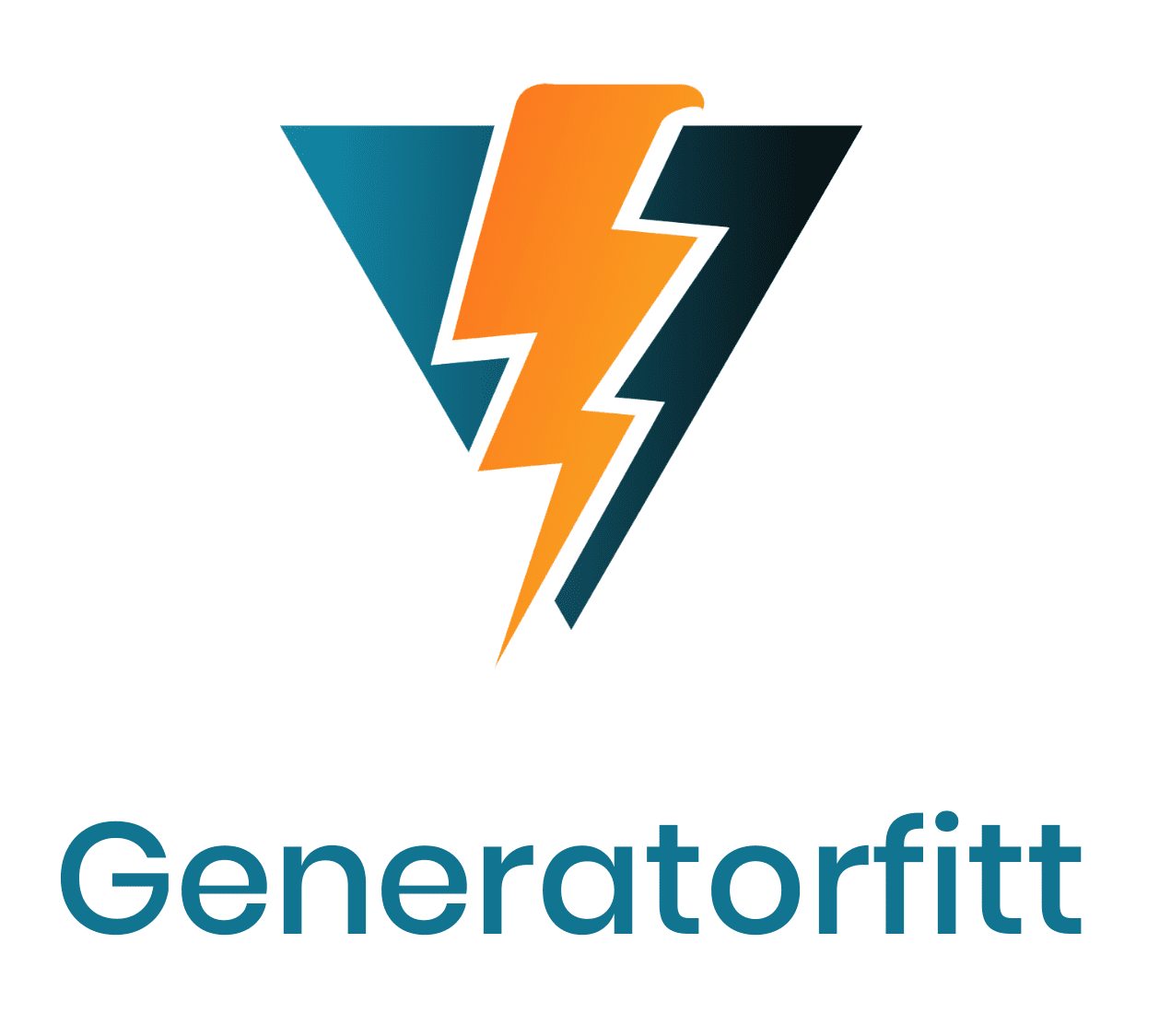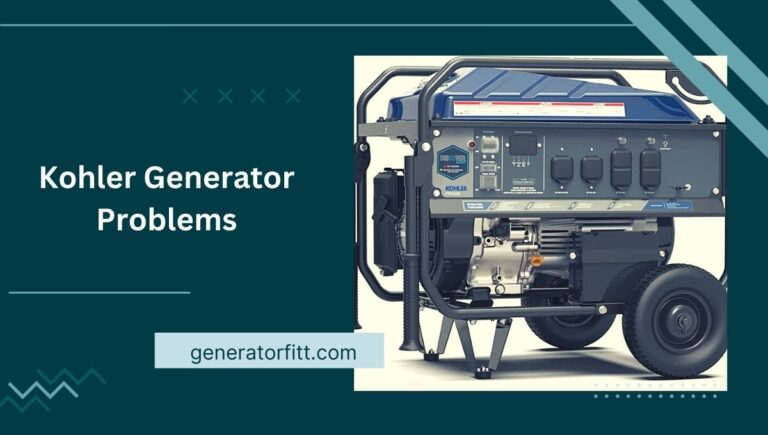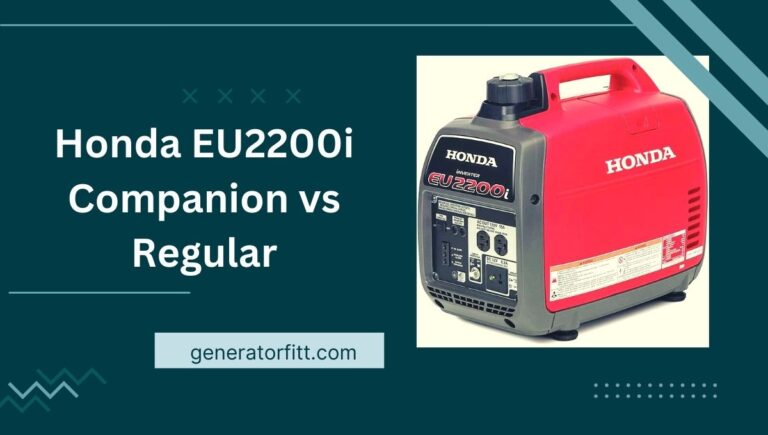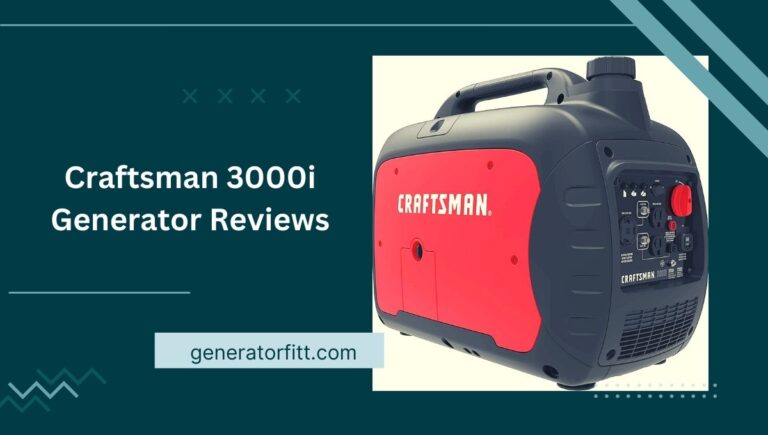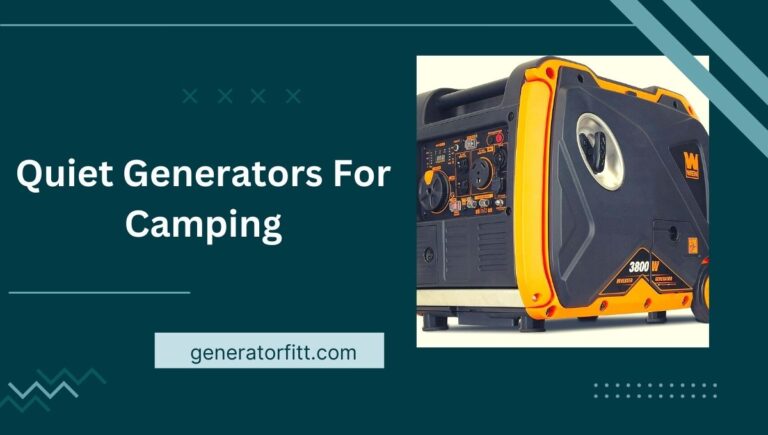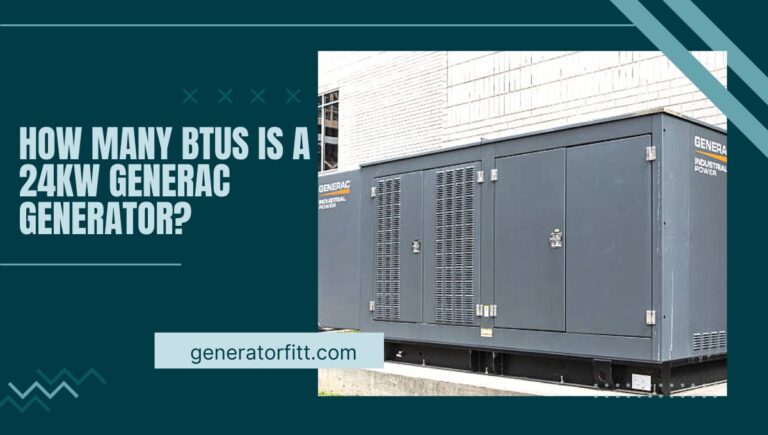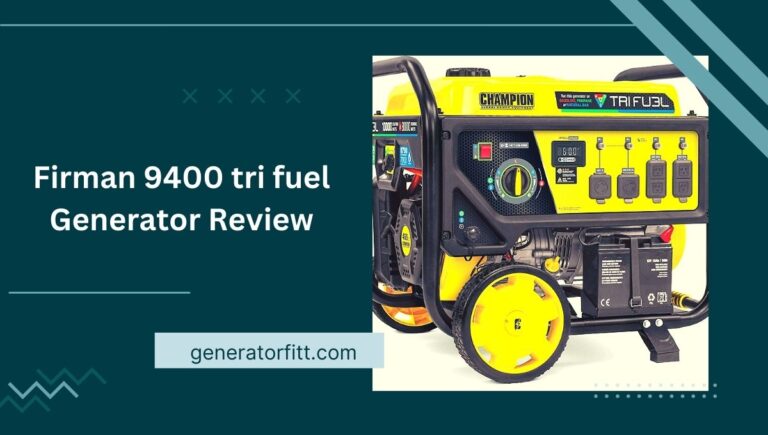5 Best Inverter Generator 220v Reviews (Pros and Cons) of 2023
In today’s fast-paced world, we rely heavily on electricity to power our homes, businesses, and various electronic devices. Inverter Generator 220v, In times of power outages or when you need a portable power source for outdoor activities, an inverter generator can be a lifesaver.
This article explores the world of 220V inverter generators, delving into how they work, their advantages, applications, and what sets them apart from conventional generators.

Top 5 Inverter Generator 220v Reviews
Top 4 Inverter Generator 220 volt Picks and Reviews in 2023:
Champion Power Equipment 100519 6250-Watt Open Frame Inverter with Quiet Technology
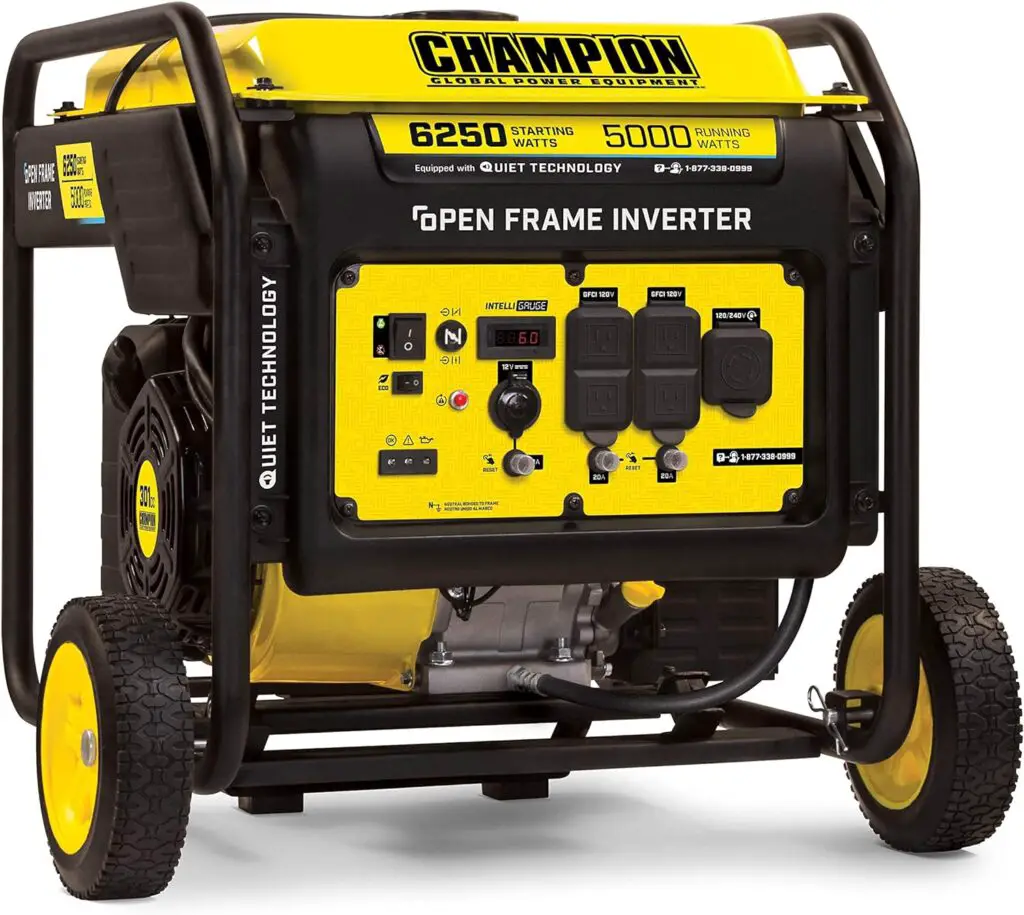
The Champion Power Equipment 100519 is a 6250-watt Open Frame Inverter generator with Quiet Technology. Inverter generators are known for their efficiency and ability to produce clean and stable power, making them suitable for sensitive electronic devices like laptops and smartphones. Here are some key features and specifications of this generator:
Key Features
- Power Output: The Champion 100519 is capable of delivering up to 6250 watts of peak power and 5000 watts of running power. This is sufficient to run various appliances and power tools.
- Inverter Technology: The “Inverter” in the name indicates that it uses inverter technology, which provides stable and clean power, making it safe for delicate electronics.
- Quiet Technology: The “Quiet Technology” in the name suggests that this generator is designed to operate with reduced noise levels. Inverter generators are generally quieter than traditional open-frame generators, and this one is likely engineered for lower noise emissions.
- Fuel Type: It’s important to note the fuel type this generator uses. Typically, portable generators like this one run on gasoline, but some models may be capable of running on propane as well.
- Parallel Ready: Some inverter generators, including Champion models, are parallel-ready. This means you can connect two compatible generators in parallel to increase your power output if needed.
- Outlets: This generator is likely to have a variety of outlets, including 120V household outlets and possibly 240V options for larger appliances.
- Portability: It’s likely designed for portability with features such as wheels and a handle for easy transportation.
- Runtime: The runtime on a full tank of fuel will depend on the load and the generator’s fuel efficiency.
- Safety Features: Inverter generators often come with safety features like low oil shutoff to protect the engine.
WEN DF475T Dual Fuel 120V/240V Portable Generator with Electric Start Transfer Switch Ready
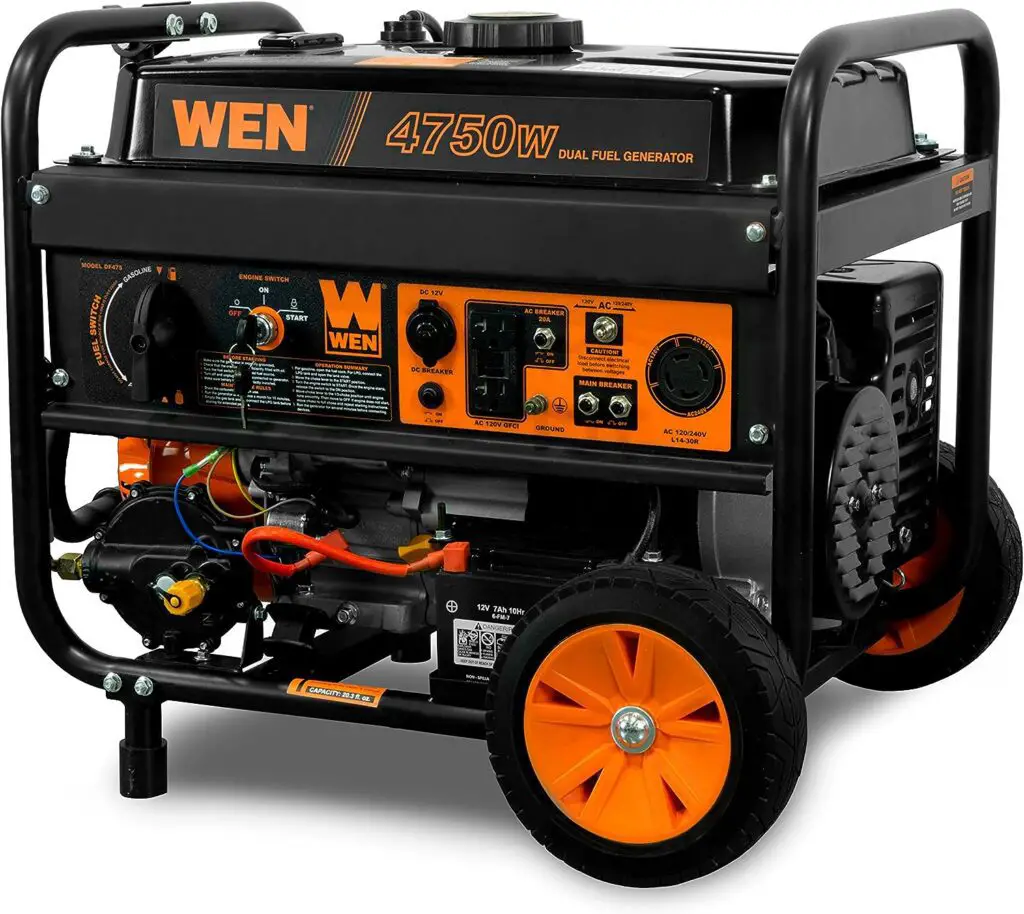
The WEN DF475T is a Dual Fuel Portable Generator designed for both versatility and convenience. Here are some key features and specifications of this generator:
Key Features
- Dual Fuel Capability: One of the notable features of this generator is its dual fuel capability. It can run on both gasoline and propane. This flexibility allows you to choose your preferred fuel source based on availability and cost.
- Power Output: The generator provides 4750 watts of peak power and 3800 watts of continuous running power. This is sufficient to power essential appliances and tools during power outages or outdoor activities.
- Electric Start: The electric start feature makes it easy to start the generator with just the push of a button, eliminating the need for manual pull starts.
- Transfer Switch Ready: The “Transfer Switch Ready” feature means the generator is equipped to be connected to a transfer switch, which simplifies the process of safely and efficiently connecting the generator to your home’s electrical system. This can be crucial during power outages to ensure a seamless power supply to your home.
- Voltage Options: The generator provides both 120V and 240V power outlets, allowing you to run a wide range of devices and appliances, including those that require higher voltage.
- Outlets: The generator is likely equipped with various types of outlets, such as 120V household outlets, 240V outlets, and possibly RV outlets to cater to different power needs.
- Runtime: The runtime of the generator will depend on the fuel source, load, and tank capacity. Make sure to check the product specifications for the expected runtime.
- Portability: Portable generators like this one typically come with handles and wheels for easy transportation.
- Safety Features: Generators often include safety features such as low oil shutoff to protect the engine and prevent damage.
- Noise Level: While not specified in the name, it’s important to check the noise level of the generator to ensure it meets your requirements, especially if you need a quieter generator for residential use.
GENMAX Portable Inverter Generator, 9000W Super QuietDual Fuel Portable Engine
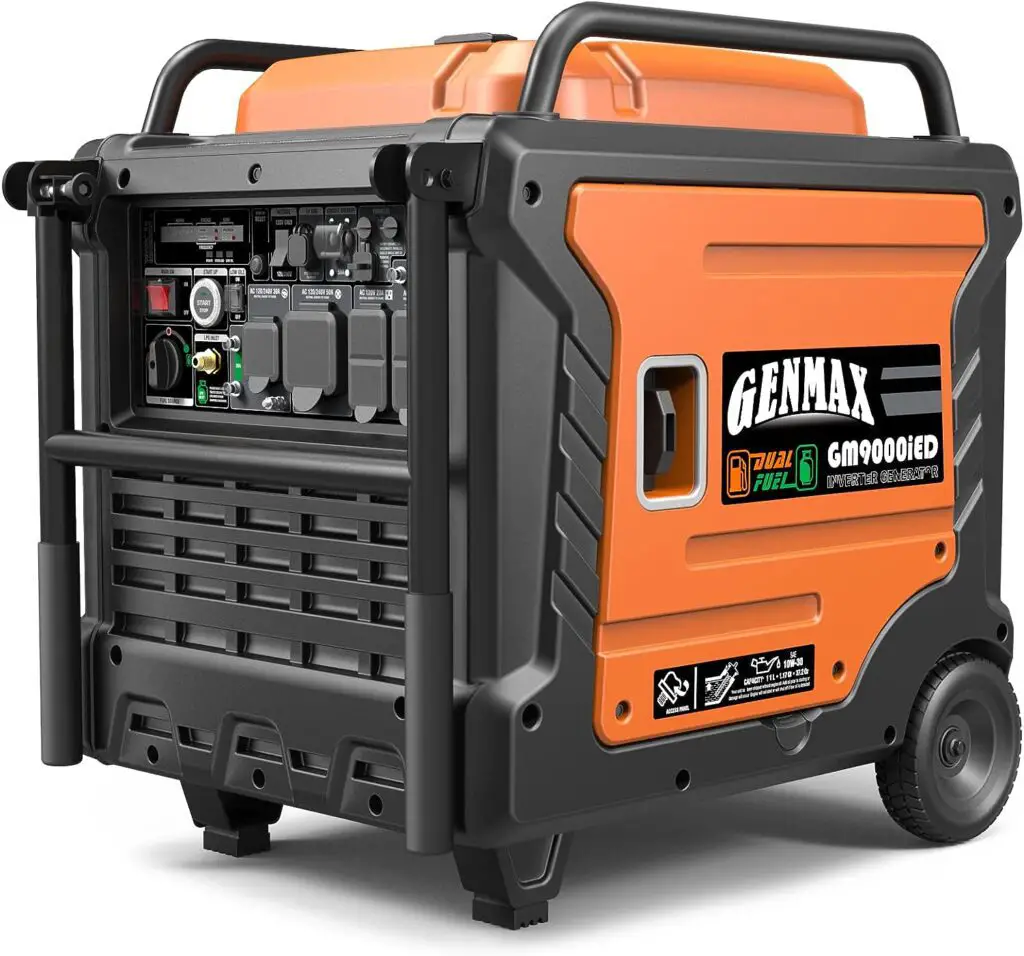
The “GENMAX Portable Inverter Generator, 9000W Super Quiet Dual Fuel Portable Engine” appears to be a portable generator designed for various applications. Here are some key features and specifications based on the provided information:
Key Features
- Power Output: This generator is rated for 9000 watts of peak power output. Peak power is the maximum output the generator can provide for short bursts, while the continuous running power might be lower. Ensure you check the continuous running power output as well.
- Inverter Technology: The “Inverter” in the name indicates that it likely utilizes inverter technology, which provides stable and clean power, making it safe for sensitive electronic devices.
- Dual Fuel Capability: The mention of “Dual Fuel” suggests that this generator is capable of running on two different fuel sources, typically gasoline and propane. Dual fuel generators offer fuel flexibility and can be useful in various situations.
- Super Quiet: The claim of being “Super Quiet” suggests that this generator is designed with noise reduction in mind. Inverter generators are generally known for their quieter operation compared to traditional open-frame generators, and the “super quiet” designation may indicate that this generator is engineered for low noise emissions.
- Portability: Portable generators like this one typically include features such as wheels and a handle for ease of transportation.
- Outlets: The generator is likely equipped with various outlet options, including 120V household outlets and potentially 240V outlets to cater to different devices and appliances.
- Runtime: The runtime of the generator will depend on the fuel source, load, and tank capacity. Be sure to check the product specifications for the expected runtime.
- Safety Features: Generators typically include safety features such as low oil shutoff to protect the engine and prevent damage.
- Voltage Options: Depending on your power needs, this generator may provide both 120V and 240V power options.
WEN DF1100T 11,000-Watt 120V/240V Dual Fuel Portable Generator with Wheel Kit
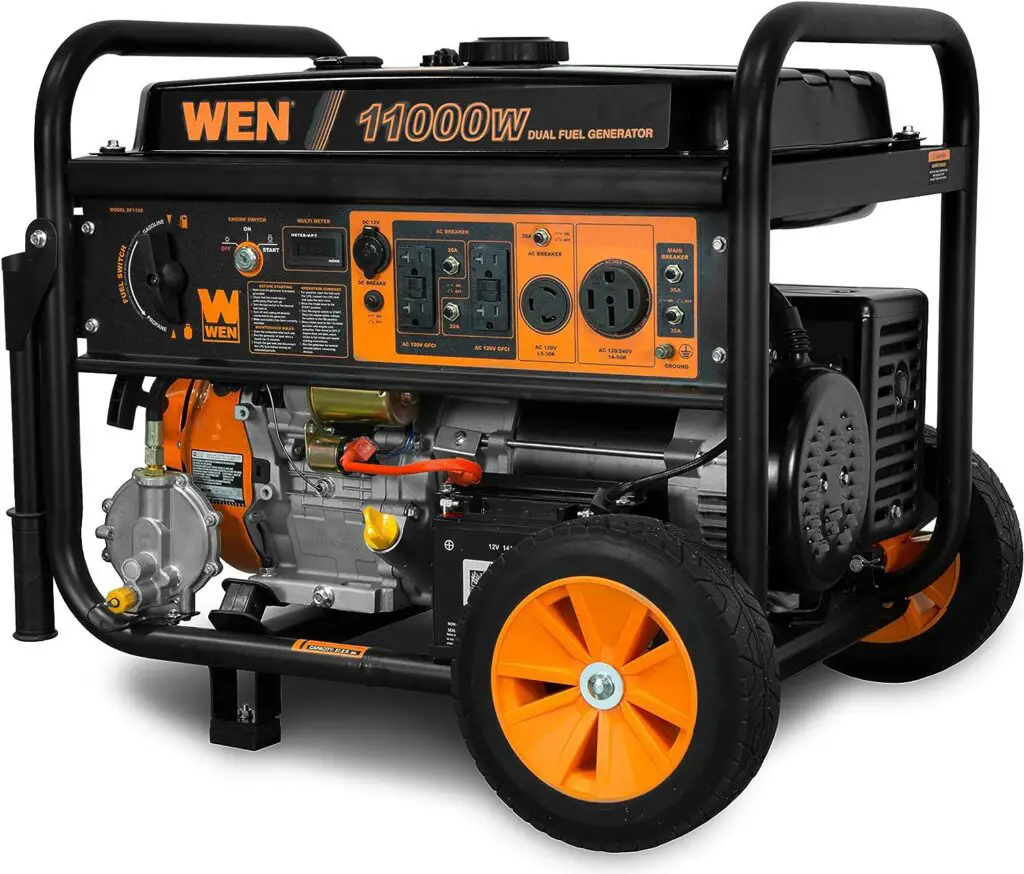
The WEN DF1100T is an 11,000-Watt Dual Fuel Portable Generator that provides power flexibility for various applications. Here are the key features and specifications:
Key Features
- Power Output: The generator offers a peak power output of 11,000 watts. It’s important to check the continuous running power rating as well, as peak power is the maximum the generator can deliver for short bursts.
- Dual Fuel Capability: The “Dual Fuel” feature means that this generator can operate on two different fuel sources: gasoline and propane. This flexibility allows you to choose the fuel type that best suits your needs or is readily available.
- Voltage Options: It provides both 120V and 240V power options, which can support a wide range of appliances and tools, including those that require higher voltage.
- Wheel Kit: The inclusion of a wheel kit makes it easier to move the generator, improving its portability.
- Outlets: The generator is likely equipped with various types of outlets, such as 120V household outlets, 240V outlets, and possibly RV outlets to accommodate different power requirements.
- Runtime: The generator’s runtime on a full tank of fuel depends on the load, fuel efficiency, and tank capacity. Be sure to check the product specifications for the expected runtime.
- Safety Features: Like most generators, this model likely includes safety features such as low oil shutoff to protect the engine from damage.
- Quiet Operation: While the specific noise level is not mentioned in the name, it’s essential to check the product specifications to ensure it meets your requirements for noise level, especially if you need a quieter generator for residential or noise-sensitive applications.
- Transfer Switch Compatibility: It’s worth checking if the generator is compatible with a transfer switch for safe and efficient connection to your home’s electrical system during power outages.
- Portability: The wheel kit enhances the generator’s portability, making it easier to move around as needed.
WEN 6000-Watt 120V/240V Generator, RV-Ready with Portable Wheel Kit

The WEN 6000-Watt 120V/240V Generator is a portable power generator with RV readiness, making it suitable for a variety of applications. Here are the key features and specifications:
Key Features
- Power Output: This generator provides a maximum power output of 6000 watts. It’s essential to check the continuous running power rating as well to understand the sustained power it can deliver.
- Voltage Options: The generator offers both 120V and 240V power options, allowing you to run a wide range of appliances, tools, and equipment.
- RV-Ready: The “RV-Ready” feature means that this generator is equipped with the necessary outlets and capabilities to power RVs and camper trailers. It may have a 30-amp RV outlet for a convenient connection to your RV’s electrical system.
- Portable Wheel Kit: The included portable wheel kit enhances the generator’s portability, making it easier to move to different locations as needed.
- Outlets: The generator is likely equipped with various types of outlets, including 120V household outlets, 240V outlets, and RV-specific outlets.
- Runtime: The runtime of the generator on a full tank of fuel will depend on the load, fuel efficiency, and tank capacity. It’s important to check the product specifications for the expected runtime.
- Safety Features: Most generators include safety features like low oil shutoff to protect the engine from damage.
- Noise Level: The specific noise level (measured in decibels) is not provided in the name. Be sure to check the product specifications to determine if it meets your noise level requirements, especially if you plan to use it in quiet or residential areas.
- Transfer Switch Compatibility: It’s a good idea to verify whether the generator is compatible with a transfer switch if you plan to use it for backup power in your home.
- Portability: The included wheel kit, combined with a handle or other portability features, enhances the generator’s mobility.
The Inverter Generators overview
Inverter generators are a type of portable power generator that provides clean and stable electricity. They use advanced technology to convert AC power to DC power and then invert it back to AC power, ensuring a consistent voltage and frequency. This results in a power source that is safe for sensitive electronic devices, making it an ideal choice for charging laptops, smartphones, and more.
Advantages of Inverter Generators
Inverter generators offer several advantages, including:
1. Clean Power
Inverter generators produce clean and stable power, preventing voltage fluctuations that can damage sensitive electronics.
2. Compact and Lightweight
They are compact and lightweight, making them easy to transport and store.
3. Fuel Efficiency
Inverter generators are highly fuel-efficient, running for longer periods on the same amount of fuel.
4. Quiet Operation
These generators operate quietly, reducing noise pollution in residential areas and during outdoor activities.
How Do Inverter Generators Work?
Inverter generators utilize a three-step process to generate electricity:
- AC to DC Conversion: The generator produces AC power, which is converted into DC power by an electronic inverter.
- DC Filtering: The DC power is then filtered to remove any fluctuations, creating a stable DC current.
- DC to AC Conversion: The stable DC current is converted back into AC power with the help of the inverter, resulting in clean and consistent electricity.
Inverter Generator vs Conventional Generator
Inverter generators differ from conventional generators in several ways. While both provide power, inverter generators have the upper hand when it comes to efficiency and convenience.
Power Output and Capacity
Inverter generators are known for their precision in delivering the exact amount of power needed, making them suitable for sensitive electronics. Conventional generators, on the other hand, may produce excessive power, which can be wasteful.
Portability and Design
Inverter generators are compact and designed for easy transportation. They are ideal for camping, tailgating, and other outdoor activities. Conventional generators tend to be larger and heavier.
Noise Level and Fuel Efficiency
Inverter generators operate quietly due to their advanced technology. They are also more fuel-efficient, making them environmentally friendly and cost-effective.
Parallel Operation
Many inverter generators can be connected in parallel to increase power output, whereas this is not a common feature in conventional generators.
Maintenance and Longevity
Maintaining an inverter generator (a type of portable generator that produces high-quality AC power) is essential to ensure its longevity and reliable performance. Here are some tips for maintaining a 220V inverter generator:
- Read the Manual: Always start by reading the manufacturer’s manual for specific maintenance instructions and recommended service intervals. Different models may have unique requirements.
- Regular Oil Changes: Change the oil in accordance with the manufacturer’s recommendations. Typically, this should be done every 25-50 hours of operation or at least once a year. Use the recommended oil type.
- Air Filter: Keep the air filter clean or replace it as recommended. A dirty air filter can lead to reduced engine performance and efficiency.
- Spark Plug: Inspect and replace the spark plug when necessary. A worn-out spark plug can affect starting and overall engine performance.
- Fuel System: Use fresh, clean fuel and add a fuel stabilizer to prevent varnish and gum buildup in the carburetor. Run the generator periodically to keep the fuel system clean.
- Coolant (if applicable): If your inverter generator has a liquid cooling system, regularly check and maintain the coolant level to prevent overheating.
- Battery: If your generator has an electric starter, ensure that the battery is charged. Keep it topped up with a trickle charger if the generator is not in regular use.
- Check for Leaks: Regularly inspect the generator for fuel or oil leaks and fix any issues promptly.
- Cleanliness: Keep the generator clean, and free of dirt, debris, and moisture. A clean generator runs more efficiently and is less prone to damage.
- Run the Generator: To prevent stale fuel and maintain internal components, run the generator for a short period (10-15 minutes) every few weeks, even if you don’t need it for power.
- Store Properly: When not in use for an extended period, store the generator in a cool, dry place with a cover to protect it from the elements.
- Professional Service: If you are not comfortable performing maintenance tasks, have a qualified technician service your generator regularly. They can identify and address issues that may not be obvious to you.
Applications of 220V Inverter Generators
220V inverter generators have a wide range of applications:
- Emergency Power: They are a reliable source of backup power during outages.
- Outdoor Adventures: Ideal for camping, RV trips, and tailgating.
- Construction Sites: Provide power for tools and equipment.
- Recreational Vehicles: Power appliances and electronics in your RV.
Choosing the Right Inverter Generator
When selecting an inverter generator, consider factors like power output, runtime, noise level, and portability. Choose a model that best fits your needs and preferences.
Safety Considerations
Ensure safe operation by following the manufacturer’s guidelines and keeping the generator away from enclosed spaces to prevent carbon monoxide buildup.
Environmental Impact
Inverter generators are eco-friendly due to their lower emissions and reduced fuel consumption. They contribute to a cleaner and greener environment.
People also ask
Can you get 240 volts from inverter generator?
No, most inverter generators are designed to provide 120 volts (V) or 220 volts (V) output, depending on the specific model. If you require 240 volts, you may need to consider other power sources or consult the manufacturer for specialized options.
What are the cons of an inverter generator?
The cons of an inverter generator may include:
Higher Cost: Inverter generators can be more expensive upfront compared to conventional generators.
Limited Power Output: They are not suitable for heavy-duty applications that require extremely high power output.
Complexity: Inverter generators have more complex electronics, which may lead to higher repair costs.
Sensitivity to Overloading: Overloading an inverter generator can lead to damage or reduced lifespan.
Fuel Efficiency Variability: Fuel efficiency may decrease under heavy loads, affecting runtime.
Is it worth getting an inverter generator?
Yes, it’s often worth getting an inverter generator due to its clean power output, fuel efficiency, and suitability for sensitive electronics. They are an excellent choice for recreational activities, backup power, and situations where quiet operation is important. However, the choice depends on your specific needs and budget.
Do any inverter generators have a 50 amp plug?
Yes, some inverter generators are equipped with a 50-amp plug, typically known as a 14-50R receptacle. This allows them to provide higher power output for RVs and other equipment that requires a 50-amp connection. Be sure to check the specifications of the specific model you are considering to confirm its capabilities.
Conclusion
In conclusion, the 220V inverter generator is a reliable and versatile power source, offering portable and efficient electricity generation for a wide range of applications. Its ability to provide clean and stable power makes it an ideal choice for both recreational and emergency use.
With its compact design and enhanced fuel efficiency, the 220V inverter generator stands as a valuable asset for those in need of consistent and high-quality power wherever they may be.
Hi, I am Brines Loe and I am an Expert in Generators I have Experience in This Field I want to Help You About This Website! Welcome to our generator (Outdoor) Guide blog! We are dedicated to providing you with the latest information and tips on outdoor generators, ensuring that you have the knowledge you need to make informed decisions about which generator is right for you.
